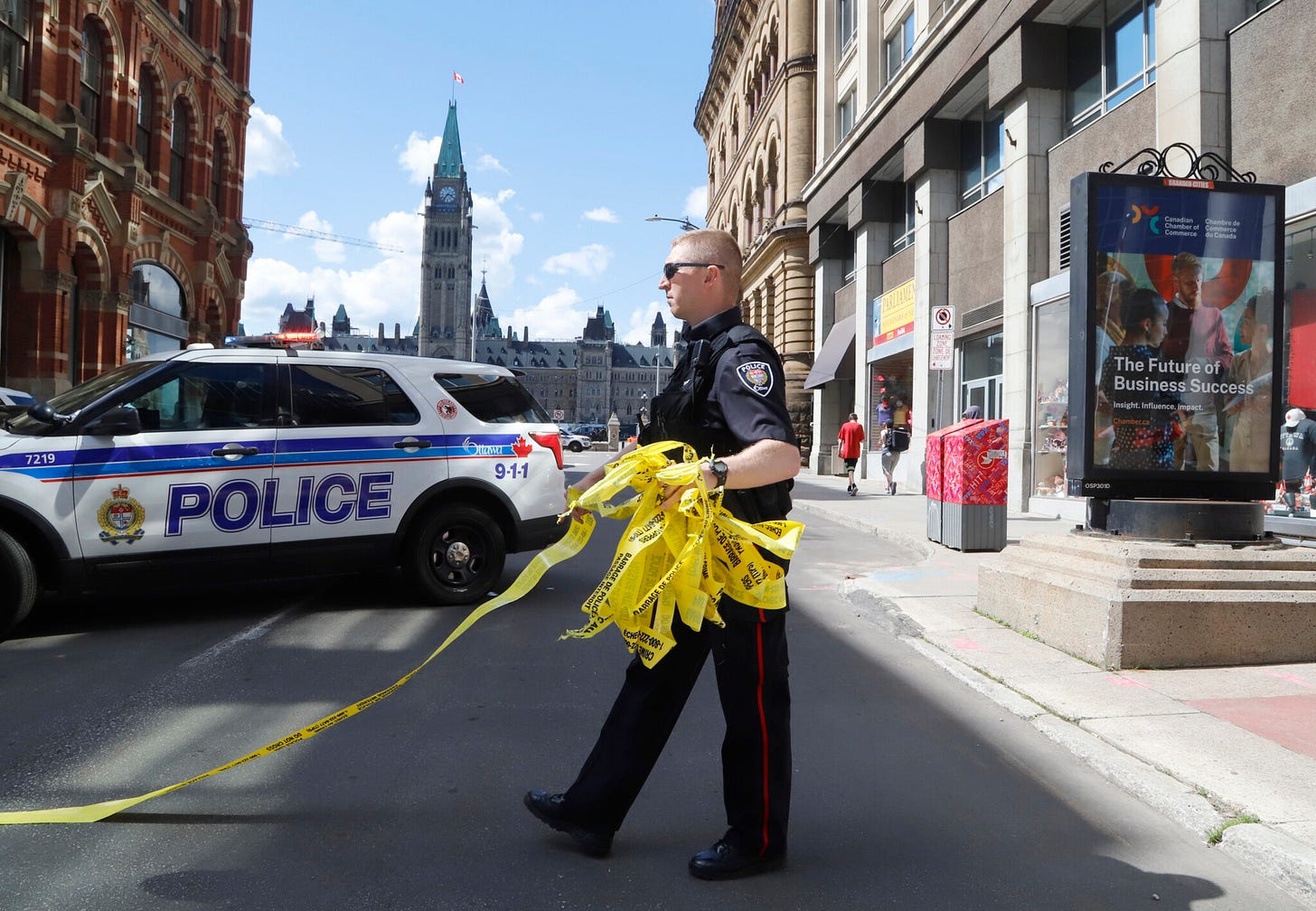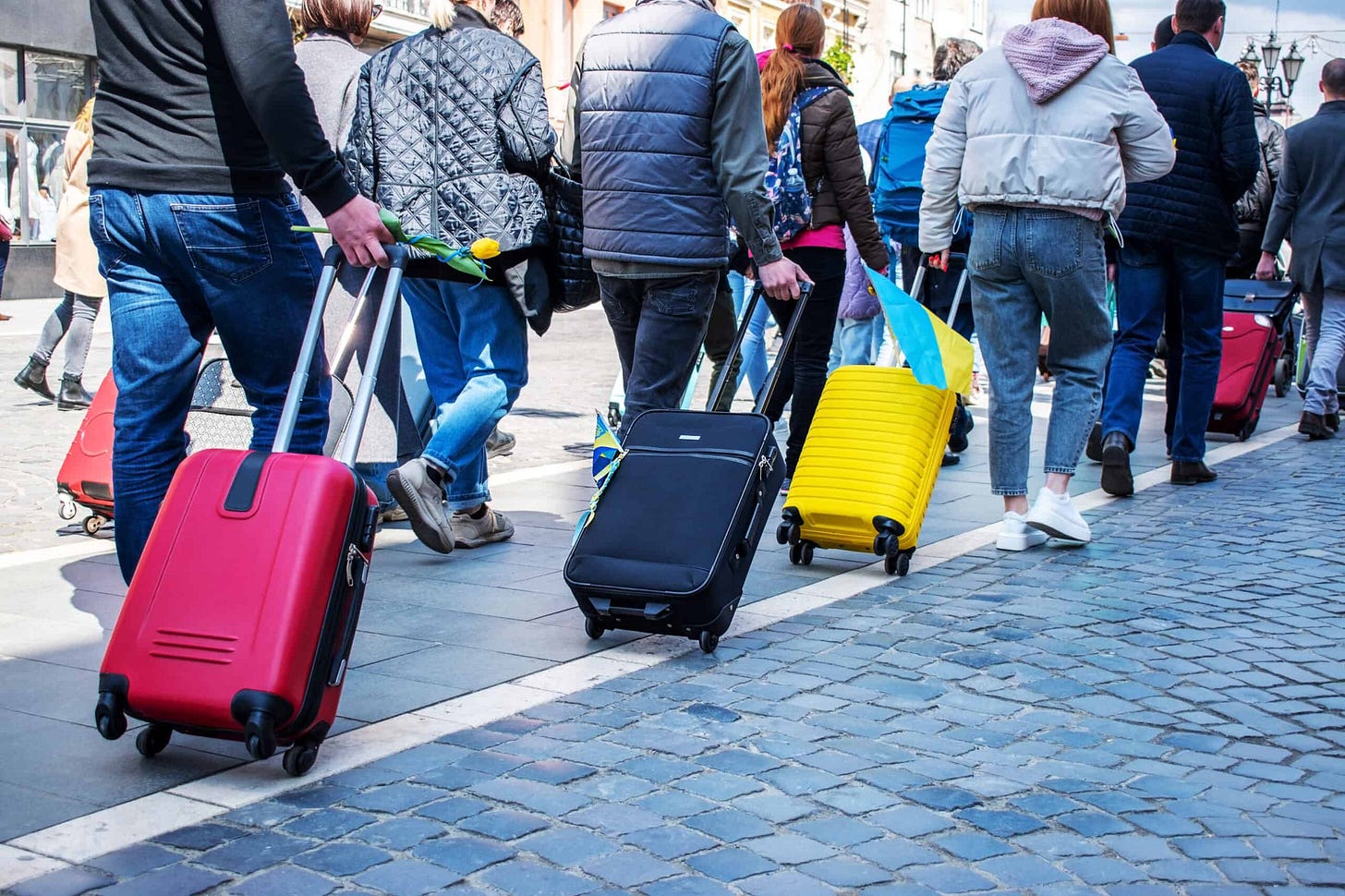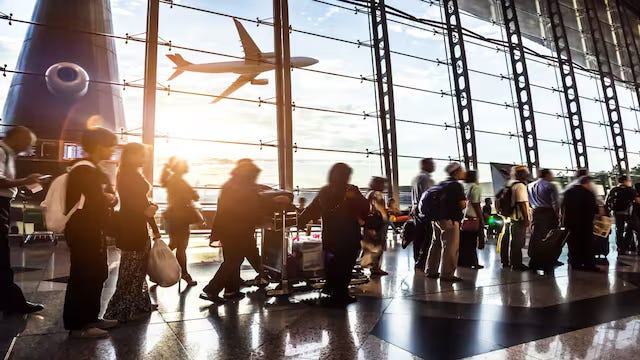Good morning, it’s Friday, July 4th. In today’s news, Canada is being infiltrated by criminals while Ottawa rolls out the red carpet, a record number of people are leaving the country, Toronto’s condo market is quietly imploding, bomb threats trigger nationwide flight delays, and much more.
First time reading the daily blend? Sign up here.
Canada Is Being Infiltrated by Criminals—And Ottawa Is Rolling Out the Red Carpet
Over the past 11 years, more than 17,500 foreigners with criminal convictions have had those convictions “forgiven” by Ottawa, allowing them to apply for entry to Canada through work, study, permanent residency, or visitation. These aren't just shoplifters and petty thieves. Immigration officials won’t release what types of crimes were pardoned, but have admitted that even serious offences are eligible—with ministerial sign-off. In 2023 alone, over 1,500 criminally convicted individuals were deemed “rehabilitated.” Only 70 were rejected.
This isn’t just a bureaucratic oversight—it’s a pattern.
Last year, an investigation by the Toronto Star revealed that federal immigration officers were instructed to skip standard fraud-prevention steps when processing temporary foreign worker applications. Officers were told not to verify whether jobs actually existed, whether legal representatives were in good standing, or whether employers had legitimate needs. Even worse, internal government documents admitted that the department had “considered and accepted the risk” of fraud in favour of faster approvals. The result? An explosion of LMIA fraud, fake job offers, and vulnerable migrants being exploited or defrauded out of tens of thousands of dollars.
Now layer on this final piece: Canada is in the middle of an organized crime explosion.
During a parliamentary meeting, the RCMP disclosed that over 4,000 organized crime groups are currently operating in Canada. According to Public Safety Canada, each group averages 20 to 50 members. Take the median estimate, and we’re talking about 140,000 gangsters embedded across the country.
This is a 400% increase from 2011, when there were around 800 groups. Just since 2021, the number has doubled. These organizations aren’t hiding in the shadows—they are infiltrating every level of society. According to the RCMP, 73% of these groups are involved in violent crime: shootings, homicides, extortion. And more than half operate across provinces and in 77 countries worldwide. Many are leveraging ties to the public sector itself—using relationships, bribes, or familial connections to gain access and protection.
The government isn’t fighting this trend. It’s enabling it.
From pardoning convicted criminals, to rubber-stamping fraudulent immigration paperwork, to dismantling financial crime units while the country becomes a global money laundering hub, Canada is becoming a magnet for professional criminals.
And the people paying the price? Ordinary Canadians.
Stats Can: A Record Number of People Are Leaving Canada
Canada is seeing a growing exodus. In the first three months of 2025, 27,086 citizens and permanent residents left the country—the second-highest first-quarter total on record, just shy of the 2017 peak. That’s a 3% increase over the same period in 2024.
And it’s not just Canadians heading for the exits. A staggering 209,400 non-permanent residents— including international students and temporary workers—also left in Q1, marking a 54% jump from last year. The trend is expected to accelerate, especially after Prime Minister Mark Carney announced tighter caps on international student and foreign worker numbers.
While nearly 10,000 people returned to Canada in the same period, the overall outflow suggests growing disillusionment or shifting priorities, particularly among those who came to Canada seeking opportunity.
The emigration story isn’t new. Canadians have been leaving in steady waves since the 1950s, with another upswing since the pandemic. According to a 2024 StatCan study, people are most likely to emigrate three to seven years after arriving. Older adults, childless immigrants, and those with higher education are more likely to go—especially if they’re entrepreneurs or investors.
Where people are from matters, too. Immigrants born in Taiwan, the US, France, Hong Kong, and Lebanon are far more likely to leave, while those from the Philippines, Vietnam, Sri Lanka, India or Jamaica tend to stay.
With the third quarter historically bringing even higher outflows, the numbers so far may just be the beginning.
Toronto’s Condo Market Is Quietly Imploding
Toronto’s condo market is quietly teetering on the edge. With sales at a 35-year low, developers are running out of cash—and options. Now, more of them are turning to “inventory loans,” borrowing against unsold units just to stay afloat.
That should set off alarm bells.
These loans aren’t inherently toxic. When used carefully, they can buy time until market conditions improve. But in today’s climate, they’re increasingly being used just to pay off old debts. According to real estate lender Nav Deo, 60% of financing requests he gets are now for these types of loans—compared to almost none last year. And he’s turning most of them down.
“A ton of builders who borrowed from Peter to pay Paul have gone belly-up,” he says.
It’s not hard to see where this goes. Condo developments are expensive and take years to build. Many of the projects completing now broke ground at the peak of the market, when prices were sky-high and interest rates were low. Since then, interest rates have spiked and condo prices have fallen nearly 20%. Selling now means either taking a loss or watching profits evaporate.
So developers are stuck. They can’t sell without bleeding, and they can’t sit on unsold units without cash flow. That’s why they’re trying to borrow against inventory—to pay off older land loans and keep creditors at bay. But these inventory loans often come at high interest rates, further compounding their risk.
The real danger isn’t just individual developers going under. It’s the domino effect. As more firms default, projects get delayed or scrapped entirely. And that’s a problem in a country already facing a chronic housing shortage. Prime Minister Mark Carney came to power on promises to build more homes—but the financial strain on developers may leave his housing ambitions dead on arrival.
And it gets worse. Fewer construction starts today mean even fewer housing completions in 2026 and 2027—just when demand is projected to rebound. That means tighter supply, higher rents, and worsening affordability down the line.
In short: Canada’s housing crisis may be quietly compounding itself.
Right now, Toronto’s real estate market is like a man treading water—borrowing time, money, and hope. But unless something gives soon, that man is going to drown. Source.
Bomb Threats Trigger Nationwide Flight Delays in Canada
Travellers across Canada are facing flight delays after NAV Canada received bomb threats early Wednesday targeting multiple air traffic control facilities. The affected cities include Ottawa, Montreal, Edmonton, Winnipeg, Calgary, and Vancouver, where air traffic control towers were temporarily evacuated.
NAV Canada confirmed all employees are safe and that operations are gradually resuming after local authorities completed threat assessments. Some ground stops have been lifted, including at Ottawa and Montreal airports, but delays and cancellations are still being reported, especially on flights between major hubs.
Passengers flying out of any of these cities are advised to check their flight status before heading to the airport, as residual disruptions may continue. More
Federal Officials Warn of ‘Lone Wolf’ Terror Threats on July 4th
New York Governor Kathy Hochul confirmed that federal officials have warned of a possible terrorist threat ahead of the July 4th holiday, with lone wolf actors considered the top concern. State police and National Guard presence will be heightened at large events and transportation hubs. While Hochul gave few details, reports cite an FBI and DHS bulletin warning of elevated threats in New York and California. Federal agencies have also warned of potential cyberattacks linked to Iran, following recent US-Israel-Iran tensions. In addition, the FBI continues to monitor rising threats tied to the Israel–Hamas conflict, particularly targeting Jewish communities. More
Canada’s Climate Change Confrontation:
Alberta and Ontario Call for Repeal of Trudeau-era Climate Policies - including the Impact Assessment Act, as well as a full repeal of the legislation authorizing the consumer carbon tax. More
Top Automaker CEOs Ask Carney to End EV Mandate - The CEOs of Ford Canada, Stellantis Canada, and GM Canada, as well as the Canadian Vehicle Manufacturers’ Association, met with Carney on July 2 and said, “The targets that have been established cannot be met.” More
FBI Dismissed Source Claims of CCP Interference in 2020 Election to Avoid Contradicting Director, Documents Show - More
Seven Missing After Massive Explosion at California Fireworks Facility as Evacuation Orders Remain in Place - Search and rescue teams resort to drones as dangers prevent direct entry into the Yolo County explosion site. More
UN: Haiti's Gangs Have 'Near-Total Control' of the Capital as Violence Escalates - More
WHO Urges Nations to Hike Taxes on Sugary Drinks, Alcohol, Tobacco by 50 Percent - More
Local Government Tax Revenue and Spending Soar Past Inflation and Population Growth
A new Fraser Institute report reveals that over the past 30 years, local governments in Canada have been collecting and spending significantly more money, growing faster than both inflation and population growth.
From 1990 to 2023, per-person revenue rose by 32.7% and per-person spending increased by 30%, reaching nearly $6,000 per person annually at its peak. This means people are paying more taxes and fees, and local governments are spending more on services and operations.
Most of this extra spending goes toward paying employees (which rose 57%), buying goods and services (up 176%), and maintaining infrastructure (capital depreciation rose 187%). Meanwhile, grant money from provincial and federal governments more than doubled and now makes up over half of municipal income, while property taxes, although higher in absolute terms, now represent a smaller share of total revenue.
Despite these big increases in revenue and spending, the report asks an important question: Are Canadians truly seeing better services—like safer neighbourhoods, improved public transit, and help for homelessness—or are budgets just ballooning without much improvement in everyday life? More
Car Trouble:
Ford Recalls More Than 200,000 Vehicles Over Malfunctioning Rearview Camera - More
Nissan to Recall Over 443,000 Vehicles Citing Engine Failure - More
NHTSA Opens Recall Query Into About 299,000 Stellantis Vehicles - More
Nvidia Stands to Lose Billions as US Curbs AI Tech to China - Nvidia will lose more than $10 billion in revenue after the United States halted sales of a chip it designed exclusively to get around export controls. More
Bombardier Shares Jump 20% After Closing Deal for 50 Jets Valued at $1.7-Billion - More
NASA Confident of 3D Printing Houses on the Moon by 2040
NASA is on track to 3D print houses on the moon by 2040 through its partnership with Texas-based company ICON, supported by over $87 million in NASA funding. Their Project Olympus aims to develop a 3D printer that builds lunar habitats using concrete made from moon dust and rock. The project, involving architectural firms and extensive testing at NASA’s Huntsville facility, seeks to overcome challenges like high radiation and low gravity. This initiative supports NASA’s Artemis missions and a long-term goal of establishing permanent human colonies on the moon and Mars. Other global efforts, including those from Australia, Russia, and China, are also developing lunar 3D printing technologies. More
Neanderthals Ran “Fat Factories” 125,000 Years Ago - At a lakeside site in Germany, neanderthals systematically processed bones from hundreds of large mammals to extract calorie-rich bone marrow, demonstrating advanced planning and resource management previously attributed only to modern humans. More
Insult to Injury: Julio César Chávez Jr Arrested by ICE 4 Days After Loss to Jake Paul
Boxer Julio César Chávez Jr. was arrested by US Immigration and Customs Enforcement (ICE) agents in Studio City, California, just four days after his fight with Jake Paul. Chávez, 39, faces expedited removal from the US due to an active arrest warrant in Mexico for involvement in organized crime and trafficking firearms, ammunition, and explosives.
He originally entered the US on a B2 tourist visa and then applied for permanent residency after marrying a US citizen, allegedly linked to the Sinaloa Cartel through a past relationship with the late son of cartel leader Joaquín “El Chapo” Guzmán. Despite being flagged as a public safety threat by immigration officials in late 2024, he was allowed reentry in January 2025 under the previous administration’s discretion. However, after multiple fraudulent statements on his residency application, authorities determined he was in the country illegally as of June 27, 2025.
Chávez Jr., son of Mexican boxing legend Julio César Chávez Sr., holds a professional record of 54-7-1 and recently lost a decision to Jake Paul. More
Australia Cancels Kanye West's Visa Over 'Heil Hitler' Song - More
Liverpool and Portugal Forward Diogo Jota and Brother André Silva Died in a Car Crash - More
Dodgers' Clayton Kershaw Becomes 20th Ever and 4th Lefty to Reach 3,000 Strikeouts - More
Wisdom Teeth Found to Contain Powerful Stem Cells Capable of Regrowing Bone, Brain, and Heart Tissue
Woman Charged Twice in the Same Day for Trafficking Cocaine - On June 28, a 40-year-old woman was arrested in the early morning for possession of illicit drugs, and again for the same thing around 9 pm
On This Day in 1776, the US Congress proclaimed the Declaration of Independence and independence from Great Britain


















